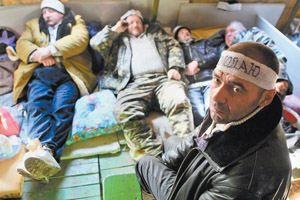Reading the signs from Donetsk
Tetiana YERESKOVA: The regime still has a chance
Things that have happened over the last few days in the Party of Regions should have become an omen for those who feel so confident in the comfortable offices on Bankova and Hrushevskoho streets in Kyiv.
So, here is an update on the latest events:
A 70-year-old mine worker died on Sunday night while the police were dismantling the tent in which the protesting Chornobyl disaster fighters were staying during a hunger strike. Shortly before the accident, the deceased Hennadii Konopliov had blamed the consequences of his hunger strike on the government of the country. This was declared in a statement written by Konopliov on the first day of his hunger strike, October 23. “I blame the consequences on the President of Ukraine, prime minister of Ukraine, the Verkhovna Rada speaker, head of Department of the Pension Fund of Ukraine of Donetsk oblast, and head of the Pension Fund Administration where I am registered,” reads the statement.
Yesterday morning about a hudred pensioners in Donetsk grabbed hayforks and other agricultural implements, and broke the doors of the Oblast State Administration building while demanding a meeting with governor Andrii Shyshatsky. The ralliers insisted on the decreasing of the housing payment rates and respecting the benefit users’ rights, in particular, those of children of war and Chornobyl disaster fighters.
Donetsk-based sociologist Tetiana Yereskova considers that people would like to trust those in power, but...
Would you describe what has happened in Donetsk as a barometer of all those in power in Ukraine?
“The results of our polls last and this year show that people would leave their homes to join rallies of protest only when painfully aware of injustice — precisely the case with Donetsk (although similar events took place elsewhere in Ukraine).
“Barometer? What would you expect it to show? The attitude of the masses to all those ‘upstairs?’” I don’t think so, considering that most in Donetsk still regard the Party of Regions as their ‘own’ [i.e., a party meant to protect their vital interests. — Ed.]. The rallies of protest in Donetsk marked a normal response on the part of individuals on the verge of despair — or at least faced with a crucial choice. The pensioners fighting to get inside the Regional State Administration had no flags of any political parties, just posters reading: ‘Down with Government!’ And so the emphasis should be on the emotional aspect: social injustice, those in power failing to keep their promises.
“I realize that there are people who wish to portray the recent events in Donetsk, it being the center of the Party of Regions’ influence, as a harbinger of a movement against the ruling political party. I think the reason is different.”
Interestingly, parallel to the events in Donetsk, there were sensational media reports about a suicide epidemic in Siverodonetsk, with one such case registered yesterday, the fourth within the past two weeks. Would you ascribe this to the mounting social tensions?
“I wouldn’t, the more so that the suicides in Siverodonetsk involved young people, and that such suicides, within this age group, are a different story. You see, had such protests started in Lviv or Ivano-Frankivsk (and I’m sure that there are people there who are prepared to do just that, that all they need is a catalyst), the media would have present them in a totally different political context. Now it appears convenient to mention such place names as Donetsk, Siverodonetsk, Makiivka.”
How about another news, I mean our MPs receiving the most expensive Notebooks?
“I try to be cautious dealing with such combinations of facts, for they may well have very unpleasant consequences. Such facts are very convenient in manipulating public opinion. Yes, these are our daily realities. There is a very long distance between those ‘upstairs’ and the man in the street, yet I wouldn’t want to make any causal conclusions, not under the circumstances.”
Yulia Latynina, a noted Russian journalist, once said that there is no peaceful way of political power transfer in Russia after Putin’s se-cond coming to power. Don’t you think that Ukraine is about to have a similar situation?
“I don’t think that this Russian scenario can be played out in Ukraine because Russia is a special sociocultural space. I have been closely following political events in Russia and yes, there is a forceful power transfer trend. In Ukraine, the political regime isn’t as strong as in Russia — simply because it lacks Russia’s resources. Besides, we have our political tradition. Would it have taken too much to disperse the Maidan? This didn’t happen because there are much stronger ethical and humanistic aspects about our country.”
What would you suggest to those in power as a professional sociologist? Where is the way out of this situation, considering that those “upstairs” appear to be doing their best to make it worse?
“Nothing new. Democratic principles. No one will buy populism these days. There should be less populism because populism is what makes one aware of social injustice. Ukrainians are clever enough to render support to those in power when they actually need it, as in the case of Ukraine-Russia gas talks. Our people would like to trust those in power, but the latter have to act transparently to enjoy public trust.”






